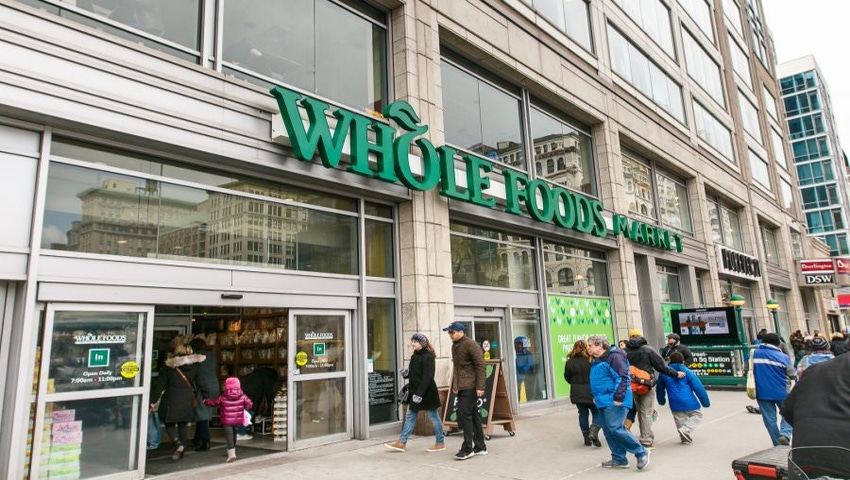A Whole Foods stockholder on Friday alleged violation of federal securities law, grumbling in a complaint that the company’s directors have reached an agreement with Amazon that effectively bars others from making successful bids for the natural foods and organic grocer.

Editorial credit for Whole Foods photo: Roman Tiraspolsky / Shutterstock.com
Whole Foods Market Inc. is facing a growing number of shareholder lawsuits over Amazon.com Inc.’s pending acquisition of the natural foods grocery chain.
Robert Berg, who owns Whole Foods common stock, on Friday filed a putative class action lawsuit in Texas federal court, alleging violation of the Securities Exchange Act of 1934. The 14-page complaint is at least the second lawsuit filed this week to block Amazon’s acquisition of Whole Foods.
Berg alleged Whole Foods’ proxy statement, filed on July 7 regarding Amazon’s deal, left out “material information," including certain financial projections, rendering the document “false and misleading."
The complaint was filed against Whole Foods and directors on its board, including John Mackey, co-chief executive and co-founder.
The price that Amazon is paying for Whole Foods (NASDAQ: WFM) is inadequate, and by agreeing to certain provisions in the merger agreement, “the individual defendants have locked up the proposed transaction and have precluded other bidders from making successful competing offers for the company," according to the lawsuit.
“The individual defendants have all but ensured that another entity will not emerge with a competing proposal by agreeing to a ‘no solicitation’ provision in the merger agreement that prohibits the individual defendants from soliciting alternative proposals and severely constrains their ability to communicate and negotiate with potential buyers who wish to submit or have submitted unsolicited alternative proposals," the complaint alleged.
“Further, the company must promptly advise Amazon of any proposals or inquiries received from other parties," the lawsuit added. “Moreover, the merger agreement contains a highly restrictive ‘fiduciary out’ provision permitting the board to withdraw its approval of the proposed transaction under extremely limited circumstances, and grants Amazon a ‘matching right’ with respect to any ‘superior proposal’ made to the company."
An earlier lawsuit was filed on Thursday against Whole Foods and its directors by Robert Riegel, a stockholder who also alleged violations of federal securities law.
Among the complaint’s allegations: that Whole Foods’ proxy statement failed “to disclose material information concerning the potential conflicts of interest faced by Whole Foods management and the board.
“The proxy statement states that, in connection with negotiating the merger agreement, Amazon had preliminary discussions with certain Whole Foods’ executive officers regarding Amazon’s desire to retain such officers following the closing," the lawsuit noted. “However, the proxy statement fails to disclose the timing and nature of all communications regarding future employment and/or benefits relating to Whole Foods management, including who participated in such communications and when Amazon first expressed its interest in retaining members of Whole Foods management following the merger."
The complaint asserted the above omissions are “particularly troubling" since Whole Foods indicated in a press release that Mackey will keep his job as CEO following Amazon’s acquisition.
Both lawsuits are pending in the U.S. District Court for the Western District of Texas. Austin, Texas-based Whole Foods did not immediately respond Friday to INSIDER’s request for comment.
According to Riegel’s lawsuit, Whole Foods received an offer in May from Amazon to acquire the company for $41 per share, but the supermarket chain countered at $45 per share.
The companies settled on $42 per share in a deal valued at US$13.7 billion.
The blockbuster merger agreement—the largest in Amazon’s 23-year history—will allow the e-commerce giant to expand its online presence and accelerate its brick-and-mortar grocery retail strategy. The company already has tested the waters through its AmazonFresh online grocery delivery service and its Amazon Go retail concept.
Whole Foods is the No. 1 natural and organic foods retailer and rang up sales of approximately $16 billion in 2016. The company has more than 460 stores in the United States, Canada and the United Kingdom.
Despite its iconic status as a destination for healthy and natural foods, the company has been under fire for more than a year. The business has faced an attempted shareholder takeover, lingering legal battles, and lagging sales due to traditional grocery chains adding more natural and organic products to their aisles.
In April, a hedge fund acquired nearly 9 percent of Whole Foods’ stock. According to TexasMonthly, Jana Partners revealed it would pressure the company to sell itself or overhaul its business, eliciting strong reactions from Mackey.
On April 26, senior representatives of Jana met with Whole Foods’ management, and according to the company’s proxy statement, demanded Whole Foods “make certain changes to its board of directors and announce an exploration of strategic alternatives."
“These people, they just want to sell Whole Foods Market and make hundreds of millions of dollars, and they have to know that I’m going to resist that," Mackey told TexasMonthly. “That’s my baby. I’m going to protect my kid, and they’ve got to knock daddy out if they want to take it over."
Although Mackey is expected to stay on as Whole Foods’ CEO under the merger, his company is poised to become Amazon’s “baby"—unless, of course, the deal falls through thanks to litigation or other forces.
Rep. David N. Cicilline of Rhode Island—the top Democrat on the House Judiciary Antitrust Subcommittee—this week called for a hearing to probe the Amazon-Whole Foods merger.
“Without taking a position on the legality of the transaction under the antitrust laws, Amazon’s proposed acquisition of Whole Foods raises important questions concerning competition policy, such as how the transaction will affect the future of retail grocery stores, whether platform dominance impedes innovation, and if the antitrust laws are working effectively to ensure economic opportunity, choice, and low prices for American families," Cicilline wrote in a letter to some colleagues, requesting a hearing.
Added the Democrat: “While several leading antitrust scholars have expressed doubt that the transaction will result in higher prices for consumers, it nevertheless occurs amidst waves of consolidation in recent decades that have decreased wages and resulted in gross inequality in the workplace."
Senior editor Judie Bizzozero contributed reporting for this article.
About the Author(s)
You May Also Like






.png?width=800&auto=webp&quality=80&disable=upscale)